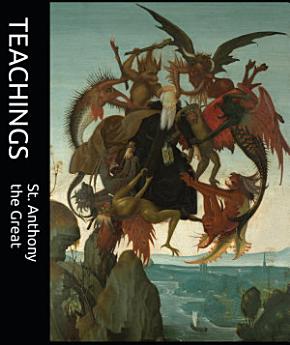TEACHINGS: ( Epistles ): of Saint Anthony the Great
About this ebook
“Wealth without work
Pleasure without conscience
Science without humanity
Knowledge without character
Politics without principle
Commerce without morality
Worship without sacrifice.
https://vidjambov.blogspot.com/2023/01/book-inventory-vladimir-djambov-talmach.html
Table of Contents ///
The Epistles of Saint Anthony the Great ///
FOREWORD ///
INTRODUCTION ///
A MESSAGE FROM ANTHONY, THE HERMIT AND HEAD OF HERMITS, TO THE BROTHERS WHO DWELL EVERYWHERE ///
BIBLIOGRAPHY ///
A word about the vanity of the world and the resurrection of the dead ///
Twenty words to monks ///
Letters to the monks ///
Various instructions for their children, monks ///
The Charter of the Hermit Life ///
Instructions on Good Morality and a Holy Life ///
Questions of Saint Sylvester and the Answers of Saint Anthony – righteous Caesarea Nazianzen
“The physician whom God gave to Egypt,” is how Saint Anthony the Great (251–356) described his friend and biographer, Saint Athanasius of Alexandria. Not only from Egypt, but from the most remote parts of the Roman Empire, a continuous stream of visitors stretched into the desert to see the hermit Anthony: priests, monks, laymen. Some went for advice in some of their business, others just wanted to be with him, learning from his silence and finding that his very presence renews hope in them. St. Anthony is a prototype of the spiritual type of an elder, a geron (Greek), a blessed "abba" or spiritual guide, which is special and characteristic of Eastern Christianity.
Many of the words and advice that Saint Anthony used to heal his Christian brothers have come down to us - processed and to a greater or lesser extent published - in his Life, compiled by Saint Athanasius, and in Apoftegms , or Words of the Hermit Fathers. However, did Saint Anthony himself take care to write down his spiritual teaching - and have these records been preserved? Life informs us that he "did not know literacy", but even so he could well dictate what he considered necessary to his students. And in fact, seven letters traditionally attributed to St. Anthony have survived.
On January 17, 356, Saint Anthony rested in a secluded desert shelter in the mountains above the Red Sea, where he had retired more than forty years earlier. For a month, Saint Athanasius, for the third time forcibly expelled from his episcopal throne in Alexandria, hid from persecution (a price was set for his head) and involuntarily shared long hours of solitude with the monks, whose prayers and whose faith have always been strong support for him. Under these conditions, he wrote as a guide for the spiritual life of monks from other places, who asked him about the Life of St. Anthony , who in the Latin translation was soon destined to play such a memorable role in the conversion of Blessed Augustine, and which remains to this day an undeniable classic of the Christian spiritual tradition.
The "Four Conversations of Caesarea" by the brother of St. Gregory the Theologian appeared among the Slavs almost at the beginning of their regular writing, or, as they call it otherwise, from the “heyday of the Bulgarian literary culture” (X century). The book is inscribed with the names of St. Sylvester, Pope of Rome, and St. Anthony, the father of monastics; both are not only “fathers of the multitude,” but also men who succeed in godliness. But for St. Sylvester, whose day is filled with deeds, care for the pulpit, for the city, for the neighboring bishops and the whole Church, it was impossible to ponder many wise things, while the Monk Anthony in his wilderness reveals the future, what is happening in the world.
Bible quotes
We are all members of each other, and the body of Christ, and the head cannot say to the leg: "I do not need you." And if one member suffers, the whole body is affected and suffers with it ... Therefore, we must love each other with all our might. For he who loves his neighbor loves God; and whoever loves God loves his soul. "
Here we hear the genuine voice of the desert experience.




